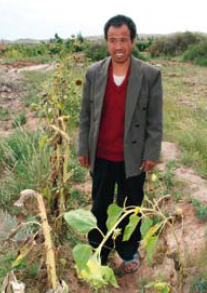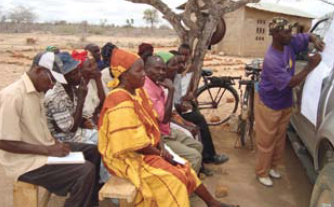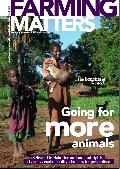How do people in various regions in the world look at the talks held in Copenhagen? And what do they think is the best plan of action for the future? Our partners from Indonesia, China and East Africa report.
Indonesia: Grassroots movements can make a big impact
-
Photo: Adam Short, Oxfam
“The mainstream media in Indonesia covered the Copenhagen conference quite well, but mostly from an environmental point of view, not so much from an agriculture point of view. For climate negotiations to make a real difference, it is better to support the growth of grassroots level initiatives rather than waiting for full support from government.
Grassroots movements, such as the Klimaforum 2009 – a group of social movements coming together from all over the world to discuss climate change solutions – have the potential to make a lot of impact. They are more likely to be sustainable in the long run (after funding has run out) and really answer the local people needs (instead of serving the interests of government or donors). Klimaforum emphasised the importance of family-based sustainable agriculture.
Furthermore, it is important to raise awareness among the youth about the devastating effects of climate change, because it is their future that will be affected. Grassroots movements, awareness raising and including the youth can form a new force to make the Indonesian government act more seriously to prevent the effects of climate change.”
Shintia D. Arwida, editor Majalah, Petani. Aliansi Organis Indonesia.
E-mail: majalahpetani@gmail.com
China: Difficult to see there is still disagreement

“Up till recently, many people in China believed climate change would not affect them. In recent years, however, unpredictable rains, prolonged droughts and crop failures have been some of the signs of global warming which have begun to affect the lives of Chinese people, especially farmers. People no longer consider that climate change is a distant threat. Therefore, China paid a lot of attention to the Copenhagen conference. Many people hoped for a final document that would reflect the common political will of the international community, and the efforts every country has made in coping with climate change. Such a document would inject new momentum for future international co-operation.
At the national and local levels, Chinese farmers have tried to be active in raising awareness about the root causes of the threats, and also in determining what actions are needed. For example, in Deqin county, one of CBIK’s project sites, villagers suffer from frequent strong winds. The traditional variety of maize could not bear the wind, so a new hybrid short-stalked variety was introduced. But the cows and yaks did not like this at all. Even if they did eat the hybrid maize, the animals did not grow as well as before and the quality of milk declined. Even if we ignore the disputes among different lobbies who attended the Copenhagen conference, climate change is never a simple issue. It is not about how humans react to the changes in nature, but about how we accompany nature during this tough ‘man-made’ period. No one can be sure what we could achieve by joint efforts, yet it is difficult to see how some people are still in disagreement.”
Ren Jian, editor LEISA China, CbIk, China.
E-mail: renjian172@126.com
Kenya: A dim beacon for the way forward

“Climate change is already devastating poor peoples’ lives. The recent prolonged drought in Eastern Africa had a big impact on vulnerable communities, with livestock deaths, famine and insufficient water for both humans and livestock. Having seen this first-hand, I attended the first week of the COP 15 conference in Copenhagen, last December. ALIN’s participation at this global conference was through a partnership with Practical Action, who had an exhibition stand. ALIN exhibited material aiming to raise awareness regarding climate change, including T-shirts with climate change messages, posters and newsletters. The conference had many exhibitions mostly focusing on what organisations and governments are doing on various climate change issues.
World leaders were supposed to negotiate the reduction of global greenhouse gas emissions, but this objective was not achieved. The talks ended with little more than an agreement to keep talking; offering a dim beacon for the way forward. The leaders of the major powers negotiated with their national interests in mind, rather than safeguarding our shared destiny.
This was quite disappointing given that prior to the conference there was a lot of hope that a deal would be sealed, especially in supporting African countries to cope with the changing climate.
In my view, developing countries will continue to experience difficulties in trying to adapt to climate change. There is a need to review the negotiating process under the UNFCCC and call upon all parties to strengthen their work within the UN system to address climate change. It is my belief that all African institutions and all Africans have a role to play in addressing climate change, hence the need to solidify their efforts to ensure that the UNFCCC-COP16 in Mexico delivers fair, adequate and legally binding outcomes.”
Noah Lusaka, editor Kilimo, ALIN, Kenia
E-mail: nlusaka@alin.net


